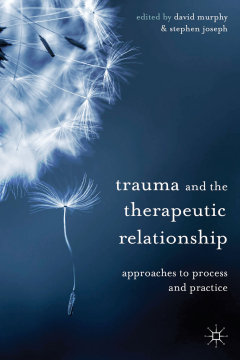
Additional Information
Book Details
Abstract
Research shows that the therapeutic relationship can offer a catalyst for healing, helping traumatized clients to make sense of and re-build their lives. This book provides practitioners with expert insight into supporting clients' recovery from trauma by placing the therapeutic relationship at the heart of the therapeutic process:
• It explores the role of the therapeutic relationship across a wide range of theoretical perspectives, including humanistic, psychodynamic and cognitive behavioural approaches.
• It brings together specialists from across the globe to provide practitioners with the latest thinking about client-centred work with trauma.
• It considers particular aspects of psychological trauma, including posttraumatic stress and posttraumatic growth.
This is the first book to combine trauma recovery with the therapeutic relationship. As such it is an important textbook for everyone with an interest in trauma therapy, whether as an aspect of training or of practice.
In this revolutionary book, Joseph and Murphy gather a cast of international experts to argue for the importance of the therapeutic relationship in treating trauma. The book is no mere theoretical argument. It is rigorously evidence-based and includes information of use to practitioners. An outstanding book.' - Arthur C. Bohart, Emeritus Professor, California State University, Dominguez Hills, USA
'David Murphy and Stephen Joseph have complied a very timely and accessible text. The chapter structure supports a range of viewpoints and techniques, drawn from an esteemed cross section of highly skilled and experienced practitioners. Their dedication to maintaining the 'therapeutic relationship' at the very 'heart of trauma therapy' is very, very welcome.' - Dr. Suzanne Jenkins, Senior Lecturer in Counselling, University of Notre Dame, Australia
"David Murphy and Stephen Joseph have collected here a diversity of approaches to working with traumatised clients bound together by an appreciation of the importance of the therapeutic relationship to successful outcomes. The contributing researchers and practitioners examine the role of the relationship from a range of therapeutic perspectives. The result is an illuminating and stimulating read." - Therapy Today
David Murphy is Lecturer in Trauma Studies at the Centre for Trauma, Resilience and Growth, University of Nottingham, UK and an Honorary Psychologist in Psychotherapy in Nottinghamshire Healthcare NHS Trust. He has worked in the area of psychotherapy for a number of years and published widely in the field of trauma.
Stephen Joseph is Professor of Psychology, Health and Social Care at the University of Nottingham, UK, where he is co-director of the Centre for Trauma, Resilience and Growth, and an Honorary Consultant Psychologist in Psychotherapy in Nottinghamshire Healthcare NHS Trust. He is a senior practitioner member of the British Psychological Society's Register of Psychologists specialising in Psychotherapy.
Table of Contents
| Section Title | Page | Action | Price |
|---|---|---|---|
| Cover | Cove | ||
| Contents | v | ||
| Foreword | vi | ||
| Acknowledgements | ix | ||
| Notes on Contributors | x | ||
| 1 Putting the Relationship at the Heart of Trauma Therapy | 1 | ||
| 2 The Therapeutic Relationship as a Common Factor: Implications for Trauma Therapy | 12 | ||
| 3 Therapeutic Alliance in Working with Trauma Survivors | 25 | ||
| 4 Affective–Cognitive Processing and Posttraumatic Growth | 44 | ||
| 5 Enhancing Emotional Regulation with Complex Trauma Survivors | 58 | ||
| 6 Chronic Traumatization and Internal Retreats: The Impact on the Therapist | 78 | ||
| 7 Working as an Expert Companion to Facilitate Posttraumatic Growth | 96 | ||
| 8 Vicarious Trauma and the Therapeutic Relationship | 111 | ||
| 9 A Reciprocal Supervisory Network: The Sanctuary Model | 126 | ||
| 10 Reflections and Directions for Future Research and Practice | 147 | ||
| Index | 155 |
